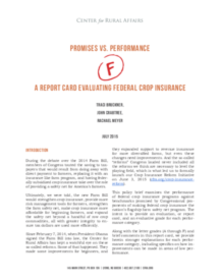During the debate over the 2014 Farm Bill, members of Congress touted the saving to taxpayers that would result from doing away with direct payment to farmers, replacing it with an insurance like farm program, and having federally subsidized crop insurance take over the role of providing a safety net for America’s farmers.
Ultimately, we were told, the new Farm Bill would strengthen crop insurance, provide more risk management tools for farmers, strengthen the farm safety net, make crop insurance more affordable for beginning farmers, and expand the safety net beyond a handful of row crop commodities, all with greater integrity to ensure tax dollars are used more efficiently.
Since February 7, 2014, when President Obama signed the Farm Bill into law, the Center for Rural Affairs has kept a watchful eye on these so-called reforms. Some of that happened. They made some improvements for beginners, and they expanded support to revenue insurance for more diversified farms, but even these changes need improvements. And the so-called “reforms” Congress lauded never included all the reforms we think are necessary to level the playing field, which is what led us to formally launch our Crop Insurance Reform Initiative on June 3, 2015.
This policy brief examines the performance of federal crop insurance programs against benchmarks promised by Congressional proponents of making federal crop insurance the nation’s flagship farm safety net program. The intent is to provide an evaluation, or report card, and an evaluative grade for each performance category.
Along with the letter grades (A through F) and brief comments in this report card, we provide herein stronger explanations for each performance category, including specifics on how improvements can be made in areas of low performance.
The Center for Rural Affairs believes the federal government has a role to play in providing an effective, targeted farm safety net. We also believe that Congress and the Administration need to change the ways that the federal crop insurance systems treats farmers, taxpayers and the environment because failing to do so could endanger the existence of an effective farm safety net in the future.


